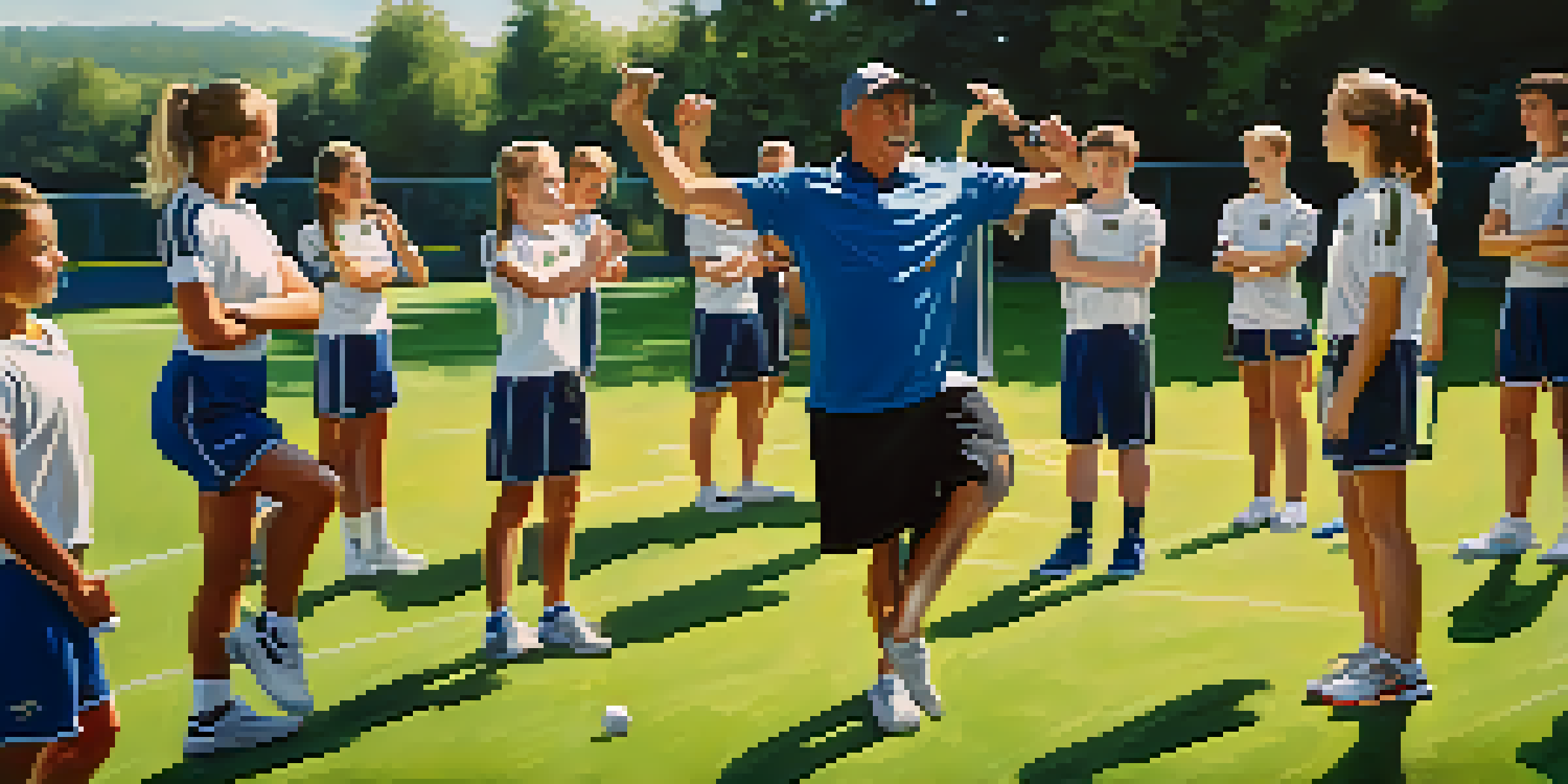The Importance of Sports Medicine Education for Coaches

Understanding the Basics of Sports Medicine Education
Sports medicine education equips coaches with essential knowledge about athletic health and safety. It covers injury prevention, diagnosis, and rehabilitation, ensuring that coaches can support their athletes effectively. By understanding these fundamentals, coaches become better prepared to respond to various situations that may arise during training or competition.
An ounce of prevention is worth a pound of cure.
Imagine being a captain of a ship without knowing how to navigate through storms. Similarly, coaches without sports medicine education may find themselves unprepared when injuries occur. This education serves as a compass, guiding them through the complexities of athlete health, thereby enhancing their effectiveness in the role.
Ultimately, a solid foundation in sports medicine allows coaches to foster a safer environment for their athletes. It empowers them to make informed decisions and act swiftly, ensuring that athletes receive the best possible care when needed.
The Role of Coaches in Athlete Health and Safety
Coaches are often the first point of contact when an athlete gets injured. They play a crucial role in identifying issues and implementing immediate care strategies. With sports medicine education, coaches can recognize symptoms of common injuries and understand when to seek further medical assistance.

Think of a coach as a guardian of an athlete's well-being. This role extends beyond training strategies and game tactics; it includes ensuring that athletes are in optimal health. A well-educated coach can help prevent minor injuries from escalating into more serious conditions, ultimately protecting their athletes' futures.
Coaches Enhance Athlete Safety
Sports medicine education equips coaches with the knowledge to effectively manage athlete health and safety.
By prioritizing athlete health and safety, coaches foster trust and respect within their teams. Athletes are more likely to perform at their best when they know their coaches have their well-being in mind.
Promoting Injury Prevention Strategies
Injury prevention is a cornerstone of effective coaching, and sports medicine education provides valuable insights into best practices. Coaches learn about proper warm-up routines, conditioning exercises, and recovery techniques that can significantly reduce the risk of injuries. This proactive approach is crucial for maintaining a healthy team.
The greatest glory in living lies not in never falling, but in rising every time we fall.
Consider the analogy of an umbrella. Just as an umbrella shields you from rain, effective injury prevention strategies protect athletes from potential harm. Coaches who understand these strategies can create training programs that emphasize safety and well-being.
Moreover, implementing these strategies not only enhances performance but also fosters a culture of care within the team. Athletes are more likely to take their training seriously when they see their coaches emphasizing safety and health.
Understanding Common Sports Injuries and Their Management
Knowledge of common sports injuries is essential for coaches to manage athlete health effectively. Conditions like sprains, strains, and fractures are prevalent in athletic environments, and understanding these injuries helps coaches provide appropriate care. Sports medicine education teaches coaches how to identify symptoms and implement initial treatment strategies.
Imagine a coach spotting a player limping during practice. Without proper knowledge, they might overlook the injury or mismanage it. However, a coach trained in sports medicine would recognize the potential severity and take immediate action to ensure the athlete's safety.
Injury Prevention is Essential
Understanding injury prevention strategies allows coaches to create safer training environments that reduce the risk of injuries.
Furthermore, understanding injury management fosters a supportive atmosphere where athletes feel comfortable discussing their health. This can lead to quicker recovery times and a more cohesive team dynamic.
The Importance of Rehabilitation Knowledge for Coaches
Rehabilitation is a critical component of sports medicine that coaches must understand. After an injury, athletes often require a structured recovery plan to regain their strength and performance levels. Coaches who are educated in rehabilitation can guide athletes through this process, ensuring they return to the field safely and effectively.
Think of rehabilitation as a bridge back to athletic performance. Coaches equipped with knowledge about rehabilitation techniques can assist athletes in crossing this bridge, helping them regain confidence and physical capabilities.
Additionally, being involved in the rehabilitation process strengthens the coach-athlete relationship. Athletes appreciate a coach who shows genuine concern for their recovery, fostering loyalty and motivation within the team.
Creating a Safe Training Environment
A safe training environment is paramount for athlete development, and coaches play a key role in establishing this. Sports medicine education provides coaches with the tools to assess training conditions, equipment, and athlete readiness. This knowledge helps them create a space where athletes can train without unnecessary risks.
Picture a well-maintained sports field where athletes can freely practice without hazards. Similarly, a coach educated in sports medicine ensures that training environments are conducive to safety and performance. This proactive mindset can lead to fewer injuries and improved overall team morale.
Effective Communication is Key
Strong communication between coaches and medical professionals ensures athletes receive comprehensive and coordinated care.
Moreover, a commitment to safety promotes a culture of accountability among athletes. When athletes see their coaches prioritizing safety, they are more likely to adopt similar attitudes towards their own training and health.
Enhancing Communication with Medical Professionals
Effective communication between coaches and medical professionals is vital for athlete health management. Sports medicine education prepares coaches to engage with healthcare providers regarding injuries and treatment plans. This collaborative approach ensures that athletes receive comprehensive care tailored to their needs.
Imagine a relay race where each runner passes the baton smoothly to ensure success. In a similar vein, coaches who communicate well with medical professionals facilitate seamless transitions in athlete care. This cooperation is essential for implementing recovery strategies and monitoring progress.

Furthermore, strong communication skills foster trust between coaches, athletes, and medical staff. Athletes are more likely to adhere to treatment plans when they see their coaches actively involved in their care.
The Long-Term Benefits of Sports Medicine Education
Investing in sports medicine education has long-term benefits for coaches, athletes, and teams. Coaches who prioritize their education not only enhance their own skills but also contribute to the overall success of their athletes. This investment pays off in the form of improved performance and reduced injury rates.
Think of sports medicine education as planting seeds in a garden. Over time, the knowledge and skills cultivated will yield healthy athletes and successful teams. Coaches who embrace this education can create a lasting positive impact on their athletes' lives.
Ultimately, the value of sports medicine education extends beyond immediate coaching responsibilities. It empowers coaches to foster a culture of health, safety, and excellence, benefiting everyone involved in the athletic journey.